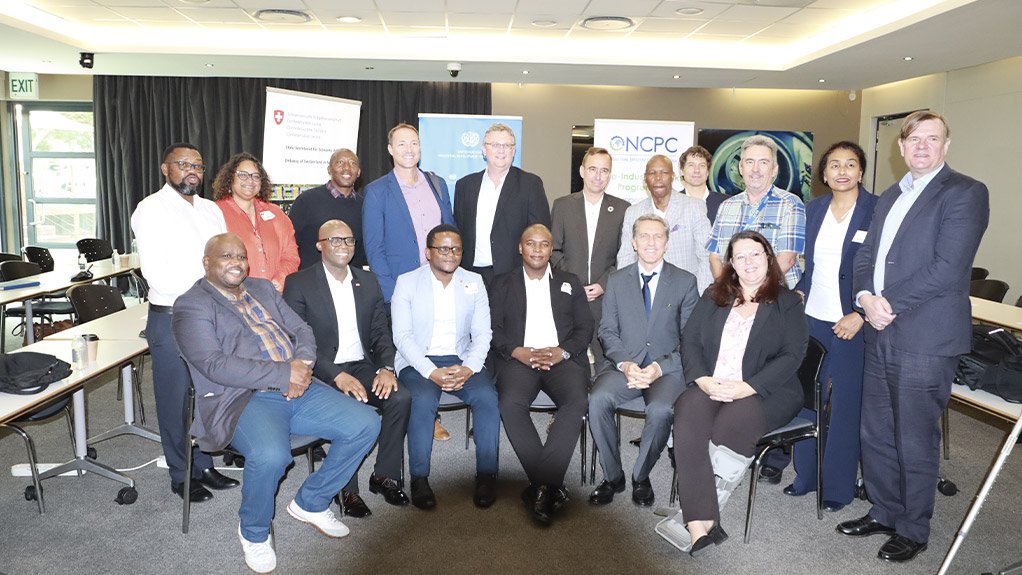

Swiss Ambassador celebrates industrial parks project success with the NCPC-SA
His Excellency Mirko Manzoni, the ambassador of Switzerland in South Africa, attended a workshop to mark the end of Phase I and the beginning of Phase II of the Global Eco-Industrial Parks Programme (GEIPP), facilitated by the National Cleaner Production Centre, South Africa (NCPC-SA), hosted by the CSIR.
Smart Places Executive Cluster Manager, Dr Bethuel Sehlapelo, opened the session with a welcoming message. Dr Sehlapelo thanked the Swiss government for the renewal of the funding that makes the GEIPP possible. “The work of the NCPC-SA in the Eco-Industrial Parks Programme will contribute greatly to the work of the Smart Places Cluster and the CSIR as a whole, in the area of industrial revitalisation,” he said. The Cluster Executive Manager explained that industrial revitalisation is one of three strategic priority programmes in Smart Places for 2024 to 2029, and the industrial sustainability initiatives in these parks form a cornerstone of the Cluster’s plans.
In his address, Ambassador Mirko Manzoni alluded to the longstanding bilateral relationship between the Swiss and the South African governments in driving economic cooperation and the role of the GEIPP in achieving sustainable development. Manzoni said, “Multiple challenges across the world, such as pollution, water shortages and climate change, impact the current and future potential to achieve sustainable development.”
The GEIPP seeks to assist industrial parks in achieving enhanced environmental, economic, and social performance through collaboration and resource management, rendering the parks more competitive and sustainable. In South Africa, the programme enhances the work of the Department of Trade, Industry, and Competition (the dtic) in the Industrial Parks Revitalisation Programme (IPRP) while supporting the government’s National Development Plan (NDP) 2030, which aims to eliminate poverty and reduce inequality by 2030.
The first programme phase was piloted in three industrial parks: Phuthaditjhaba, Ekandustria, and East London Industrial Development Zone (ELIDZ). In this phase, the United Nations Industrial Development Organization (UNIDO), the dtic and the NCPC-SA conducted capacity-building workshops, Resource Efficient and Cleaner Production (RECP) assessments, park benchmarking, and knowledge-sharing forums. “The achievements in the first phase have been substantial enough to convince the State Secretariat for Economic Affairs (SECO) to continue into the next phase,” said Manzoni.
Opportunities identified through the GEIPP interventions
The participating parks have identified opportunities to enable their eco-industrial park transition journey by evaluating their performance against international EIP framework measures. The performance benchmark scoring considers the park's economic, social, environmental, and management performances. In practice, managing resources such as water, energy and enhanced circularity and synergies within the parks, play a critical role in improving their performance.
In 2020, the ELIDZ was the highest-performing industrial park, achieving a score of 80% against the performance benchmarks and improved to 82% in 2022. Phuthaditjhaba Industrial Park scored 31% in 2020, but improved to 43% in 2022. The park managers in attendance highlighted that they had identified significant opportunities through the programme. Among these were, promoting circular economy synergies between tenant companies, deploying renewable energy sources to improve energy security and setting up internal wastewater treatment plants to help attract investment to the parks while benefiting the surrounding communities. Currently, a renewable energy master plan has been drafted for Phuthaditjhaba and further work to facilitate implementation will be done in phase two.




